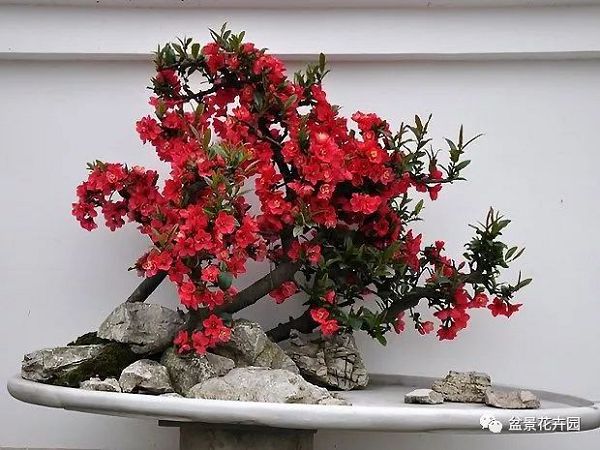Culture methods and growth conditions of bonsai of various flowers

In the bonsai cultivation of flowers, the flowering period can be promoted and controlled by artificially adjusting the environmental conditions, so as to make the flowers bloom timely according to people's wishes. Flowering earlier than natural flowering is called facilitative cultivation, and later than natural flowering is called inhibitory cultivation.
Increase the temperature and blossom early. Woody flowers dormant in winter, such as green peach, plum blossom, elm leaf plum, begonia, peony and so on, can blossom in the Spring Festival after a period of low temperature in winter and high temperature treatment for another 10-50 days. Some perennial flowers and autumn-sown grass flowers can also bloom ahead of time when they are cultured in a greenhouse before the beginning of winter. The heating time should be determined according to the scheduled florescence and the habits of the flowers themselves. If plum blossoms and rhododendrons are required to blossom during the Spring Festival, it takes 10 days for plum blossoms and 40 days for rhododendrons to blossom after moving into a greenhouse of 20: 25 ℃.
Delay growth, postpone flowering. For the budding flower bonsai, such as chrysanthemum, melon and leaf chrysanthemum, the metabolism can be inhibited and the flowering period can be delayed by low temperature and low light treatment.
Early dormancy, early flowering. If peony, peony, cherry blossom, yellow thorn rose and clove are to blossom during the Spring Festival, they should be moved to the cold storage two months before the Spring Festival for two weeks to promote their dormancy, and then gradually move into the greenhouse to make them germinate and blossom earlier.
Long-day treatment. In order to make some long sunshine bonsai flowers bloom in winter, the purpose of promoting flowers can be achieved by replenishing light and increasing temperature at night. The light time is generally more than 16 hours, such as Gladiolus. Long-day treatment can also inhibit the flowering of short-day flowers, such as late chrysanthemum in mid-September, treated with 40 watt fluorescent lamp for 6 hours a day, the flowering of New Year's Day can be delayed at room temperature of 20 ℃.
Short-day treatment. Short-day flower bonsai, such as poinsettia, leaf flowers, etc., can be shaded by black cloth and black paper to reduce the light time and prolong the dark period to promote its early flowering. If you want to blossom on National Day, it can be shaded in early August, and the daily sunshine time can be shortened to 8: 10 hours.
Reverse day and night and change flowering habits. Epiphyllum originally blossomed at night, selected strong epiphyllum plants with buds, moved into the darkroom when the buds were 10 cm, and treated with 60 watt fluorescent lamps for 4 days from 7 pm to 6 am the next day, so that epiphyllum could blossom during the day.
Hormone treatment. The use of some growth hormone can promote the early flowering of bonsai flowers, but also delay the florescence. For example, gibberellin can relieve dormancy and stimulate growth, while naphthylacetic acid can inhibit flowering.
Related
- What if the leaves of potted flowers turn yellow?
- Florescence Control of several Flowers
- Anti-freezing technology and post-freezing nursing technology of flowers
- What is the classification of flowers? What are the common methods of flower classification?
- Prevention and control of alkali and acid damage of flowers in courtyard
- Technology of Anti-freezing and restoring growth of Flower seedlings in greenhouse and greenhouse
- How does flower fertilization not hurt the root? Fertilization technology of flowers
- Key points of disinfection in flower greenhouse
- Several pesticides that are banned or used cautiously in flowers
- How to fertilize the flowers that watch the leaves?


